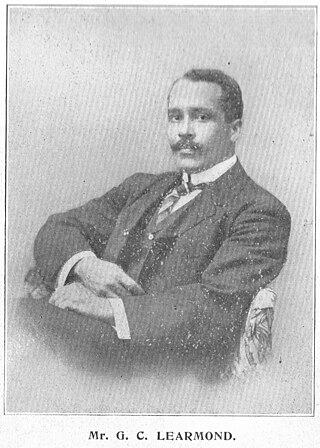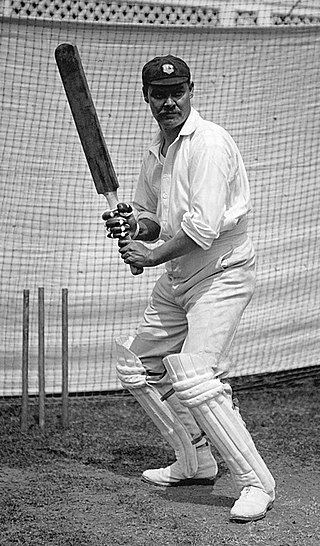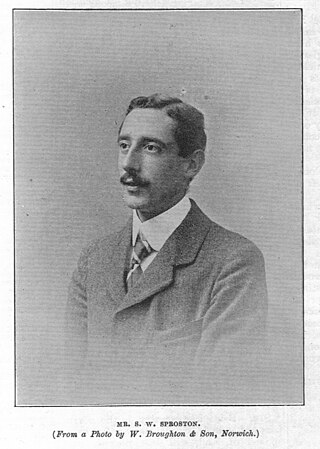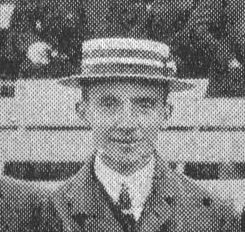Related Research Articles

John Barton "Bart" King was an American cricketer, active in the late 19th and early 20th centuries. King was part of the Philadelphia team that played from the end of the 19th century until the outbreak of World War I. This period of cricket in the United States was dominated by "gentlemen cricketers"—men of independent wealth who did not need to work. King, an amateur from a middle-class family, was able to devote time to cricket thanks to a job set up by his teammates.

Clifford Archibald Roach was a West Indian cricketer who played in West Indies' first Test match in 1928. Two years later, he scored the West Indies' first century in Test matches, followed two matches later by the team's first double century. Roach played for Trinidad, but before having any great success at first-class level, he was chosen to tour England with a West Indies team in 1928 and scored over 1,000 runs. When England played in the West Indies in 1930, he recorded his ground-breaking centuries but had intermittent success at Test level afterwards. He toured Australia in 1930–31 and returned to England in 1933, when he once more passed 1,000 runs, but was dropped from the team in 1935. Within three years, he lost his place in the Trinidad team. Roach was generally inconsistent, but batted in an attacking and attractive style. Outside of cricket, he worked as a solicitor. Later in his life, he suffered from diabetes which necessitated the amputation of both his legs.

George Challenor was a Barbadian cricketer who was part of the first West Indies Test side, and who faced the very first ball bowled to a West Indian cricketer in a Test match. He was recognised as the first great West Indian batsman, his obituary in Wisden Cricketer's Almanack ending with the words "His admirable batting did much toward raising cricket in West Indies to Test match standard". Challenor was born in Waterloo, St. Michael, Barbados and died in Collymore Rock, St. Michael, Barbados. He visited England three times as a member of a West Indian touring team; in 1906, 1923 and 1928.

The Philadelphian cricket team was a team that represented Philadelphia, Pennsylvania, in first-class cricket between 1878 and 1913. Even with the United States having played the first ever international cricket match against Canada in 1844, the sport began a slow decline in the U.S. This decline was furthered by the rise in popularity of baseball. In Philadelphia, however, the sport remained very popular and from the end of the 19th century until the outbreak of World War I, the city produced a first class team that rivaled many others in the world. The team was composed of players from the four chief cricket clubs in Philadelphia–Germantown, Merion, Belmont, and Philadelphia. Players from smaller clubs, such as Tioga and Moorestown Cricket Club, and local colleges, such as Haverford and Penn, also played for the Philadelphians. Over its 35 years, the team played in 88 first-class cricket matches. Of those, 29 were won, 45 were lost, 13 were drawn and one game was abandoned before completion.
The West Indian cricket team toured England in the 1900 season. The team played 17 matches between 11 June and 11 August 1900.
The Philadelphian cricket team made a tour of Jamaica in February 1909. The Philadelphians played 3 first-class matches against the Jamaicans winning two and losing one. This was one of the last first-class tours for the Philadelphian team. The city of Philadelphia was nearing the end of its golden age of cricket and the last first-class game for the team would be played only three years later.
A team of amateur cricketers under the captaincy of Arthur Priestley toured the West Indies in the 1896–97 season, playing matches between January and March 1897. They played a total of sixteen matches of which nine are regarded as first-class. They did not play in British Guiana.

Charles Augustus Ollivierre was a Vincentian cricketer who represented the West Indies in matches before they attained Test match status. Born in St Vincent, Ollivierre initially played first-class cricket for Trinidad; he was selected to tour England with the West Indies team in 1900. He later qualified to play first-class cricket for Derbyshire between 1901 and 1907, becoming the first black West Indian to play for an English county. Ollivierre was reasonably successful in county cricket and had a reputation as a stylish batsman. However, he dropped out of first-class cricket after 1907 owing to eye trouble.
William Henry Mignon was a West Indian cricketer who toured with the first West Indian touring side to England in 1900. He was the son of Edward Adolphus Seymour Mignon and Margaret Bridget.

George Cyril Learmond was a West Indian cricketer who toured with both of the first two touring sides to England in 1900 and 1906.
Lionel Smythe D'Ade was a West Indian cricketer who toured with the first West Indian touring side to England in 1900.

Percy Arnold Goodman was a Barbadian cricketer who toured with the first two West Indies touring sides to England in 1900 and 1906. He was one of the top West Indian batsmen of his day and was also an effective medium-pace bowler, especially in his younger days. "A big finely-built man, Goodman perhaps carries a little more flesh than a cricketer would elect to bear in a hot climate."

Stanley Winfield Sproston was a West Indian first-class cricketer who toured with the first West Indian touring side to England in 1900 and captained the side for much of the tour in the absence of Aucher Warner.
Delmont Cameron St Clair Hinds was a coloured West Indian cricketer who toured with the first West Indian touring side to England in 1900. He was known as Fitz Hinds.

William Thomas Burton was a coloured West Indian first-class cricketer best known as a member of the 1900 and 1906 West Indian tourists to England.
The West Indian cricket team toured England in the 1906 season. The team played 19 matches between 11 June and 18 August 1906 of which 13 were regarded as first-class.

Charles Stuart Morrison was a West Indian cricketer who toured with the second West Indian touring side to England in 1906. He was a right-handed batsman and a slow medium bowler.
John Joseph Cameron was a West Indian cricketer who toured with the second West Indian touring side to England in 1906. A Doctor, he was a right-handed batsman and a slow right arm bowler.

Archibald Belford Cumberbatch was a West Indian cricketer who toured England in 1906. He was a right arm fast bowler.

George Alphonso Headley OD, MBE was a West Indian cricketer who played 22 Test matches, mostly before World War II. Considered one of the best batsmen to play for the West Indies and one of the greatest cricketers of all time, Headley also represented Jamaica and played professional club cricket in England. West Indies had a weak cricket team through most of Headley's playing career; as their one world-class player, he carried a heavy responsibility and the side depended on his batting. He batted at number three, scoring 2,190 runs in Tests at an average of 60.83, and 9,921 runs in all first-class matches at an average of 69.86. He was chosen as one of the Wisden Cricketers of the Year in 1934.